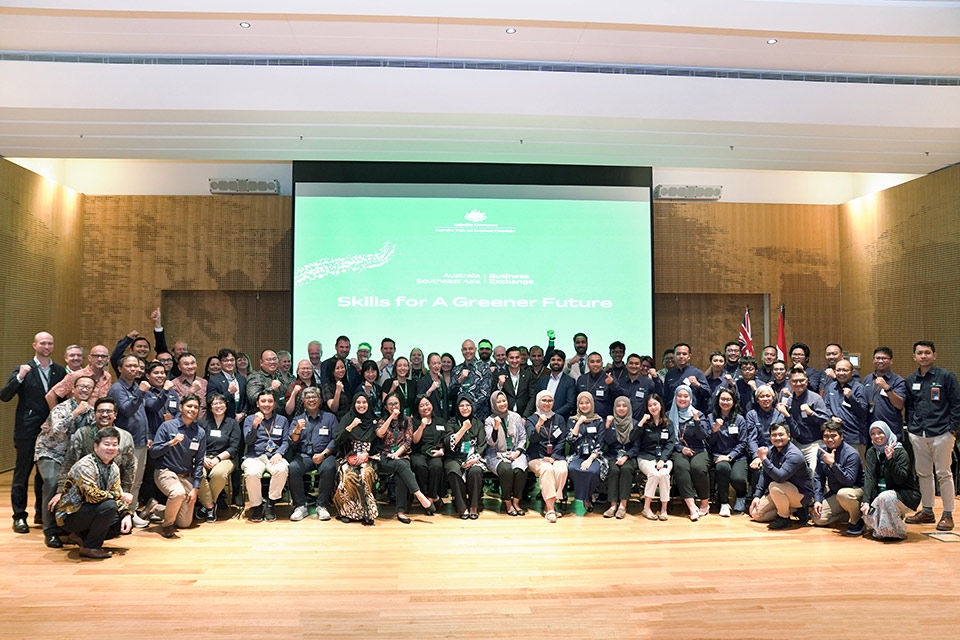Indonesian electricity company PT Perusahaan Listrik Negara (Persero) (PLN) is leading Indonesia’s energy transition to help meet the country’s goal of net-zero emissions by 2060. To do this, the state-owned company is reshaping itself into a dynamic, entrepreneurial and innovative organisation.
Reconfiguring an 80-year-old, conservative and highly regulated company has required more than changing the corporate structure, explains Pak Yusuf Didi Setiarto, Director of Human Capital Management at PLN. It has meant reshaping corporate culture, mindset and skills, and creating a ‘new DNA’.
Four of Australia’s leading universities are partnering with PLN on this transformational, capacity-building program. The company is sending its employees to study in Australia, learning the critical skills and knowledge to help PLN and Indonesia transition to clean energy.
Embarking on a multi-phase transformation
In 2023, PLN supplied more than 89 million customers across the Indonesian archipelago. Nearly 85% of electricity generated in Indonesia still comes from coal or gas generation.
In May 2025, the Indonesian Government officially approved the country’s 2025–2034 Power Supply Plan (RUPTL). The country is aiming for 42.6 GW of new renewable energy generation by 2034, bringing the total share of renewables in Indonesia’s network to 35%.
This will mean managing 3 parallel transformation projects, explains Pak Didi:
- planning and designing the technical and commercial transition to green energy generation
- developing the business development expertise to unlock the value from new business opportunities
- building the digital technology expertise to manage a renewable-powered grid covering tens of thousands of islands in Indonesia’s archipelago.
PLN quickly realised it would need to develop its people, explains Pak Didi. Staff would need to learn a new range of skills. The company also needed to encourage a new mindset and new approaches to learning, technology and problem-solving.
Connecting with Australian universities
PLN’s plan was to send employees to study overseas to build technical skills and gain exposure to innovative, technology-led working environments.
PLN had a budget to fund the study program. But faced with the scale and speed of transformation, PLN sought domestic and international support. This included encouraging employees to apply for Indonesia’s national education endowment fund (LPDP) and other scholarships such as the Australia Awards Scholarship (AAS). PLN implemented a comprehensive preparation program for its employees, such as intensive English language training and collaboration with top universities.
The LPDP funding required students to study in an internationally recognised university, so PLN was keen to work with high-ranking institutions. It also needed to find courses in a range of disciplines. These included science, engineering and digital technology, asset management, renewable financing, business development, law and public policy.

PLN executives had opportunities to meet with Australian university representatives on an Australia-Southeast Asia Business Exchange future skills mission to Indonesia.
Australia was an obvious destination, given its geographical and strategic relationship with Indonesia, says Pak Didi. The country is one of the world’s top destinations for international students. Its excellent educational institutions, globally ranked courses and focus on real-world learning could provide the study opportunities PLN was looking for. Australia’s net zero by 2050 target also meant many Australian organisations have started rolling out transition plans, and PLN’s staff could learn from them.
Austrade’s support was invaluable in introducing PLN to Australian universities. In particular, the Australia-Southeast Asia Business Exchange future skills mission to Indonesia in September 2024 allowed PLN to meet with multiple universities at one event. The company could communicate its needs and gain an understanding of the universities’ curricula and teaching methodologies.
Exposure plus experience key to culture change
To date, PLN has engaged with leading institutions in Asia, Europe and Scandinavia. It has signed Memoranda of Understanding with 4 Australian universities: Monash University, The University of NSW, University of Queensland and University of Melbourne. The universities have also had opportunities to work with PLN on joint research projects.
So far, of more than 500 staff participating in the program, more than 300 have studied in Australia. Students have also had the opportunity to visit Australian scientific and energy facilities to see technology and problem-solving in action.
The combination of academic excellence and practical exposure has been key to success, says Pak Didi.
‘Sometimes seeing is believing,’ he says. ‘Offering exposure and experience has allowed staff to imagine how the technologies could work in their own environment.
‘Leading the energy transition is a huge challenge,’ says Pak Didi. ‘With planning, strategy and support, we are ready.’
Influencing organisational change across Indonesia
PLN’s work is also delivering broader change in Indonesia. Its program is offering a model for other organisations on how to finance and manage similar development programs. The company has also set up cross-organisational communities of practice to support and develop renewable energy capabilities in Indonesia, explains Pak Dedi Budi Utomo, Executive Vice President Human Talent Development.
‘The real mark of success for PLN is giving its people confidence to engage in international forums and show leadership in tackling the global energy challenge,’ he says.
Sign up to receive the latest news and insights about Southeast Asia.
Go further, faster with Austrade
Austrade’s Go Global Toolkit helps you learn the export basics, find the right markets and understand market requirements.